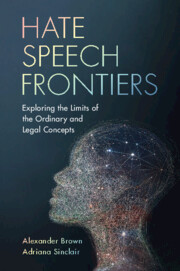Book contents
- Hate Speech Frontiers
- Hate Speech Frontiers
- Copyright page
- Dedication
- Contents
- Acknowledgements
- 1 Conceptual Frontiers in the Understanding of Hate Speech
- Part I The Ordinary Concept
- Part II The Legal Concept
- 5 Orienting the Ordinary and Legal Concepts of Hate Speech
- 6 Between Hate Speech and Hate Crime
- 7 Denialist Speech
- 8 Epilogue
- Notes
- Index
7 - Denialist Speech
from Part II - The Legal Concept
Published online by Cambridge University Press: 26 October 2023
- Hate Speech Frontiers
- Hate Speech Frontiers
- Copyright page
- Dedication
- Contents
- Acknowledgements
- 1 Conceptual Frontiers in the Understanding of Hate Speech
- Part I The Ordinary Concept
- Part II The Legal Concept
- 5 Orienting the Ordinary and Legal Concepts of Hate Speech
- 6 Between Hate Speech and Hate Crime
- 7 Denialist Speech
- 8 Epilogue
- Notes
- Index
Summary
Chapter 7 argues that denialist speech can, and should, be classified as a sui generis form of hate speech in the legal sense of the term. Section 7.2 looks at the many faces of denialist speech, including forms of synchronous denialism that are often overlooked in these debates. Sections 7.3 and 7.4 address the thorny problem of classification and attempt to explain why it matters. In Sections 7.5 and 7.6 we turn to examine in more detail the spread of denialism laws at the domestic level and try to uncover the many different functions or purposes served by such laws. Finally, in Section 7.7 we address two sceptical challenges to our main thesis. First, if denialist speech is rightly classifiable as hate speech, then why were denialism provisions absent from the early landmark international laws dealing with incitement to genocide and hate speech in general? And second, if denialist speech can be considered hate speech despite its absence from landmark international laws, then what about other things, such as defamation of religion, and what prevents our characterisation of hate speech in the legal sense from becoming absurdly capacious?
Information
- Type
- Chapter
- Information
- Hate Speech FrontiersExploring the Limits of the Ordinary and Legal Concepts, pp. 399 - 486Publisher: Cambridge University PressPrint publication year: 2023
